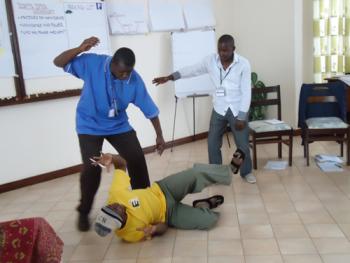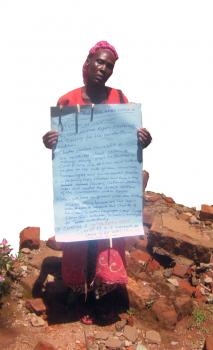
‘Our colonial masters were brutal in their governance. The independence leaders saw that as their role model, so they too used oppression and brutality to rule. It became generational. We have not been taught alternative ways of making our point.’ These are the words of Malesi Kinaro, executive director of Friends Peace and Community Development, a Kenyan Quaker organisation that in 2009 invited the British Quaker Turning the Tide (TTT) programme to come to meet, learn and explore how we might work together.
She continued: ‘In many of our Listening and Alternatives to Violence Project workshops with the youth we were asked many, many times: “So what you guys are saying is that we should not have reacted to this unfairness with violence. But if we hadn’t been violent you wouldn’t be here to begin with.” I promised them that we were coming with a programme that would teach them the practical way of demonstrating but without violence.’
So this was the challenge for TTT: to collaborate with our local partner to design and develop a nonviolent campaigning programme specific to Kenya, which will support Kenyans who, after the trauma of the post-election violence in 2008, want to fight oppression, corruption and injustice with nonviolence.

TTT’s way of working has been our main asset in meeting this challenge. Our trainings are not off-the-peg. We design each workshop around the needs of the group and do whatever it takes to help the group reach its learning goals, even if that means changing the plan mid-workshop. One thing that has stuck with everyone is our mantra ‘The plan is to change the plan!’
TTT Kenya training goals:
- Develop understanding of, ability to use, and belief in nonviolence as a means to social justice.
- Gain greater awareness of self as an agent for nonviolent social action and as a group member/community organiser/facilitator.
- - Practice and develop facilitation and training skills using TTT tools and methods.
- - Create an opportunity for a support network to develop amongst workshop participants and their groups.
- - Share (existing) and develop (new) TTT tools for organising people to work for nonviolent social change.
We have learned a lot. The way we were explaining conceptual models did not seem to resonate, but stories and case studies did. English is not everyone’s first language. Our cultural reference points often fell flat. The word ‘activist’ in Kenya has a negative connotation. Western examples of successful nonviolent campaigns are not so meaningful for Kenyans; African ones are.
Short on time to prepare the first phase, we were grateful for the training we’d received on Super-T courses, run by Training for Change in North America. This helped us to jump further into our discomfort zones, take bigger risks, use diagnostic tools more sharply to read the group dynamic and boldly use emergent design (changing the plan mid-workshop) to meet the group’s learning needs and address group dynamics.
Without question the Super-T trainings helped us to work more flexibly and confidently. This was on a foundation of TTT’s almost 20 years of home-grown experience running workshops and developing nonviolence curriculum and training for our resource people (volunteer trainer/facilitators). And the support and guidance from Kenyan colleagues is crucial. They decode cultural nuances, give us vital feedback and gradually have been crafting and sharing their learning into nonviolent campaigning methods specific and appropriate for Kenya.
This project of training and ongoing accompaniment has taken us to Western Kenya (2010), Nairobi (2011) and North Rift Valley (2012).
The training model begins with an intensive residential workshop, followed by fieldwork to start the community campaigns, then follow-up residential training to review and develop the campaigns and strengthen facilitation skills. This typically is spread over a three- or four-month period, and our accompaniment from a distance is ongoing.
With each phase, TTT Britain has taken a step back and Kenyan colleagues have stepped forward, taking bigger risks, gaining confidence and developing their skills to help groups organise and address injustice in their communities. We know that as campaigns become more effective, so the level of danger and explicit threats increase, so further training has been provided on security.
Our Kenyan partner CAPI (Change Agents for Peace International) co-ordinates the programme, including selection of trainees. While in Kenya it is common for workshop participants, meeting attendees, and people at political rallies to receive a ‘sitting fee’ (payment), from the outset we were determined not to support such a system. Like any struggle against deeply-embedded cultural practices, at first this was difficult for some trainees and the groups they work with to understand. But now groups are finding creative ways of making campaigns and workshops financially and emotionally viable.
Slowly people are becoming convinced of nonviolent campaigning and our Kenyan colleagues report never having trouble filling a workshop or event.
As our CAPI comrades take on the work, it is wonderful to see the amazing campaign successes, the energy and commitment of the resource people and their communities.


